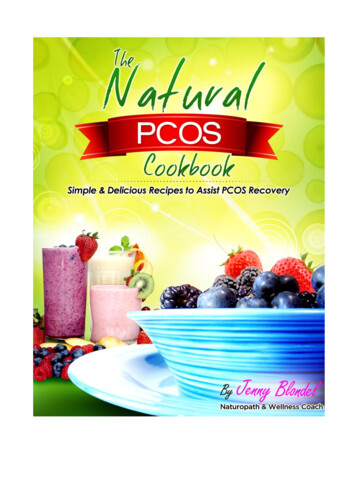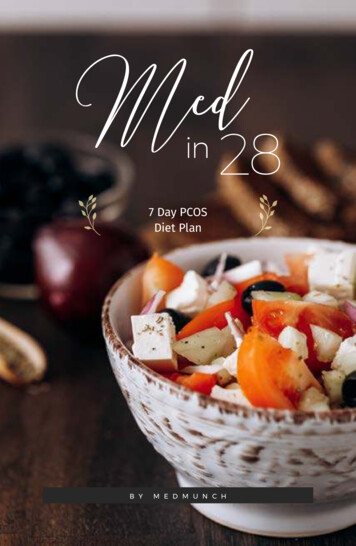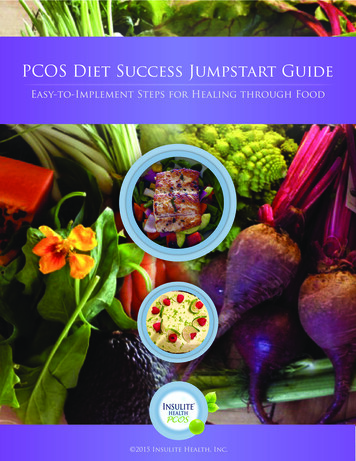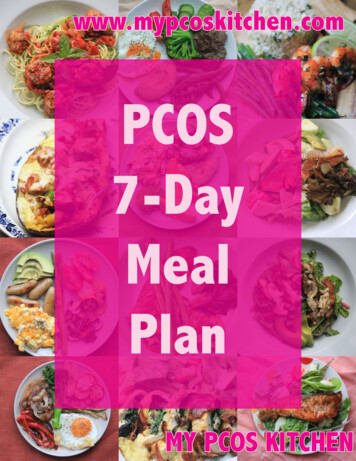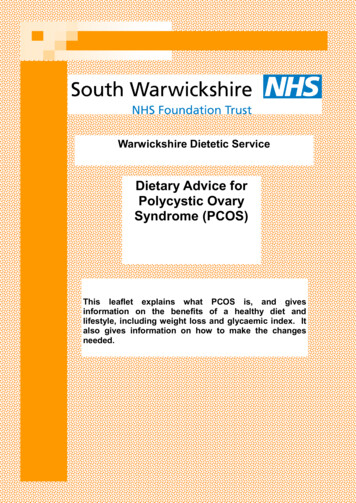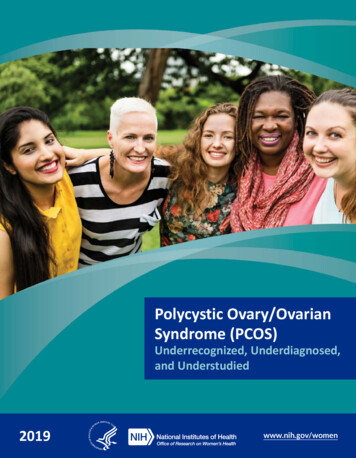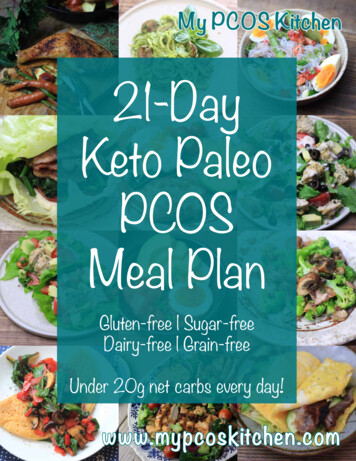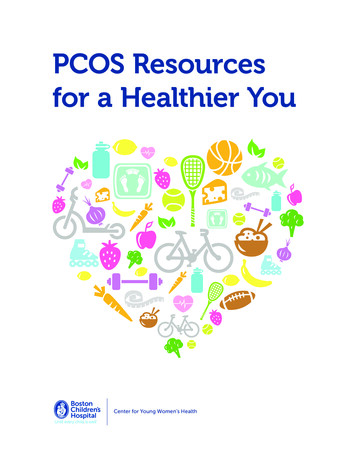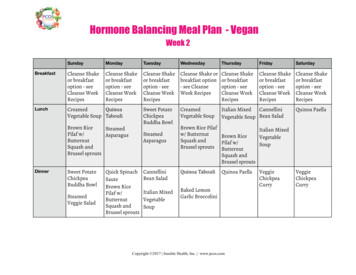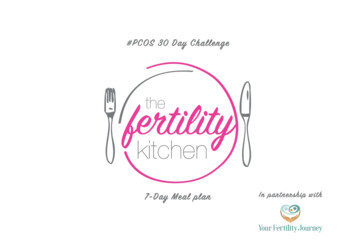
Transcription
The Natural PCOS Diet ContentsPagePreface3Chapter 1: What is PCOS?4Chapter 2: Signs and Symptoms of PCOS6Chapter 3: What Causes PCOS?8Chapter 4: The Link Between PCOS and Inflammation12Chapter 5: Insulin Resistance Syndrome13Chapter 6: The Link Between Insulin Resistance Syndrome and PCOS14Chapter 7: The Leptin Link16Chapter 8: Gluten Intolerance and PCOS18Chapter 9: Diagnosing PCOS19Chapter 10: Recommended Testing for PCOS20Chapter 11: Medical Treatments for PCOS21Chapter 12: Natural Treatments for PCOS23Chapter 13: The Excess Oestrogen Connection24Chapter 14: What are Environmental Oestrogens?26Chapter 15: Managing Oestrogen Dominance29Chapter 16: Safeguarding Yourself From Hormone Disruptors30Chapter 17: Diet and Excess Oestrogens31Chapter 18: Fertility, Pregnancy and PCOS33Chapter 19: Introducing the Natural PCOS Diet34Chapter 20: Get to Know your Food Groups38Chapter 21: Other PCOS Diet Tips46Chapter 22: The Natural PCOS Diet Guidelines and Food Plan47Chapter 23: Supplements for PCOS52Chapter 24: Exercise for PCOS55Chapter 25: Meditation for PCOS58Chapter 26: PCOS Case Studies60Conclusion64The Natural PCOS DietPage 2
PrefacePolycystic ovarian syndrome (PCOS) is one of the most common hormone imbalancedisorders affecting women. And one thing’s for sure, PCOS leads to a long list ofdistressing symptoms. For many women, infertility is one of the most devastatingconsequences.The good news is that a comprehensive natural treatment strategy can address theunderlying causes of this complex hormone disorder. Put simply, natural treatments canhelp relieve symptoms and prevent the condition from becoming worse. A healthy diet,specialised nutrients, specific herbal medicines, targeted homeopathic remedies andmeditation are all effective ways to manage PCOS.How Can The Natural PCOS Diet Help You?For many years I had my own private clinical practice, where I treated numerous clientssuffering from PCOS and helped them get their health back on track. My treatment planempowered my clients to achieve lasting results, and inspired them to take better care oftheir general health.I know from firsthand experience what it takes to see results, and I want to share mypractical advice with you. Imagine having all the information you need from an expert toimprove your hormone health in natural ways. The Natural PCOS Diet is my step-by-stepguide to help you manage and overcome PCOS.The Natural PCOS Diet offers real solutions to help you: naturally balance your hormones increase your chances of conceiving help you lose weight and feel good curb your cravings for sugary foods turn your fatigue around achieve clear, glowing skin see improvements in your mood.It’s possible to recover your hormone health so begin your journey to wellness now.Best wishes,Naturopath and Wellness CoachThe Natural PCOS DietPage 3
Chapter 1: What is PCOS?Polycystic ovarian syndrome (PCOS) is ahormonal disorder characterised by theaccumulation of what appears to be numerousfluid-filled cysts on the ovaries. These developover time as the ova (eggs) fail to mature, thenrelease during the menstrual cycle. This causesmultiple immature ova to be visible on anultrasound, which are mistakenly called cysts.PCOS affects 6‒10% of women in developedcountries and up to 30% of overweightwomen.1,2 The lack of ovulation associated withPCOS is the leading cause of infertility inwomen of reproductive age.Despite the name, not all women with PCOS have polycystic ovaries, although most do.The cysts are just one of the many signs and symptoms of PCOS (which will be discussedin Chapter 2: Signs and Symptoms of PCOS).A Poly-glandular SyndromePCOS is far more than just a reproductive problem ‒ it affects an entire cascade ofhormones and each PCOS sufferer’s experience with this syndrome is very different.PCOS is a complex syndrome which disrupts normal hormone balance and blood sugarlevels. It can result in weight gain, menstrual problems, fertility problems and skin andhair problems.It is not just the ovaries that are affected by this syndrome. The Hypothalamic-PituitaryAdrenal (HPA) axis, adrenal glands, pituitary gland, thyroid gland, pancreas and even theliver can be detrimentally involved in this syndrome.Because PCOS can affect a women’s appearance, metabolism and fertility, manypsychological issues such as anxiety, depression, relationship problems and eatingdisorders can manifest.There is substantial evidence that PCOS should no longer be considered purely agynaecological disorder, but a complex hormone disorder.12Normal RJ et al. Medical Journal of Australia, 2004; 180(3):132-137.Eggers S et al. Anthropol Anz 2007; 65(2):169-179.The Natural PCOS DietPage 4
To be diagnosed with PCOS, two out of the following three things must be present: Polycystic ovaries ‒ diagnosed by ultrasound Irregular or absent periods from an early age A change in the amount of body and facial hair, or high levels of testosterone inthe blood.The Natural PCOS DietPage 5
Chapter 2: Signs and Symptoms of PCOSPCOS does not just affect your ovaries. There can be devastating effects on your wholebody.The cysts on polycystic ovaries are tiny, and look like black dots on the ovary on anultrasound. The cysts are actually multiple immature ova (eggs that have failed to fullymature) that have not been released from the ovary.Signs and symptoms of PCOS include: infertility ovarian/pelvic pain irregular or absent menstruation irregular or absent ovulation increased facial and body hair (hirsutism) male pattern hair growth weight gain and obesity acne, oily skin and skin pigmentation hyperkeratosis of the skin reduced libido (sex drive) fatigue (often as a result of sleep apnoea) hypoglycaemic episodes mood swings hypothyroidism.You may only experience a few of these symptoms or you may be able to tick them all.The Natural PCOS DietPage 6
A note on hirsutismOne of the most distressing and de-feminising symptoms of PCOS, hirsutism (excessivehair growth) can vary from mild and hardly noticeable, to severe and needing removalevery day.Hirsutism is a symptom of high testosterone levels, which can be due to insulinresistance (insulin increases the production of testosterone), low sex hormone bindingglobulin (SHBG), or higher conversion of testosterone precursors in the skin and haircells. This activity of androgens in the skin stimulates abnormal patterns of hairgrowth.Interestingly, hirsutism occurs in 70% of women with PCOS in the USA, as opposed toonly 10‒20% of Japanese women. This may be explained by the genetically determineddifferences in 5-alpha-reductase activity between different cultures. From a holisticstandpoint, hirsutism may reflect differences in hormone behaviour in accordancewith local diets and levels of physical fitness.What is 5-alpha-Reductase?5-alpha-reductase is an enzyme produced in the prostate, adrenal glands and scalp thatmetabolises the male hormone testosterone into DHT (dihydrotestosterone). DHT is ahighly active form of testosterone known to stimulate prostate growth and scalp hair loss.DHT can cause hair follicles to shrink and enter a permanent dormant state. Thiscondition is more common in men but may also occur in women during menopause, dueto low oestrogen levels.The Natural PCOS DietPage 7
Chapter 3: What Causes PCOS?A basic understanding of the causes of PCOS will help empower and motivate you to makepositive changes to your diet and lifestyle to help overcome this condition.While researchers are not certain of the exact cause of PCOS, it is known that animbalance of the endocrine (hormonal) system is responsible for many of the changesassociated with PCOS. However, it is still not known exactly what causes those changes.In this chapter, the following plausible causes will be discussed: Hormone connection Insulin resistance Weight Genetics Inflammation Leptin Resistance Gluten Intolerance.Hormone ConnectionIn women with PCOS, the ovaries make more androgens than normal. Androgens are malehormones that females also produce. High levels of these hormones affect thedevelopment and release of eggs during ovulation.Problems with OvulationHormones are proteins produced by a structure within the body that causes a changewithin a cell or organ. The Hypothalamic-Pituitary-Ovarian (HPO) axis is a system ofhormonal control within the body. The hypothalamus is a gland within the brain that,when stimulated, produces a hormone known as Gonadotropin-Releasing Hormone(GnRH). This then travels to the pituitary gland, another small structure in the brain. Thepituitary gland produces a variety of other hormones which regulate and maintain manybody functions, including ovulation.In a normal menstrual cycle, follicles grow on the ovaries. Within those follicles eggsdevelop, one of which will reach maturity faster than the others and be released into thefallopian tubes. This is known as ovulation. The remaining follicles (sometimes hundreds)will degenerate. This happens in response to hormone changes ‒ the fluctuation ofoestrogen and progesterone. This response is stimulated by hormones released from yourpituitary gland ‒ the Luteinising Hormone (LH) and Follicle Stimulating Hormone (FSH).In the case of polycystic ovaries, however, the ovaries can appear much larger thannormal, and there are a series of undeveloped follicles that appear in clumps, like abunch of grapes.The Natural PCOS DietPage 8
Hormonally, elevated androgens inhibit FSH, thereby inhibiting development andmaturation of the follicles. High testosterone levels elevate LH levels (but not in allcases). Testosterone levels can be twice the normal range (20‒80ng/dL).HyperprolactinemiaAbout 25% of PCOS sufferers have elevated prolactin, known as hyperprolactinemia. Thisresults from abnormal oestrogen negative feedback via the pituitary gland. Elevatedprolactin can, in turn, also contribute to elevated oestrogen levels, suppressprogesterone release and compromise normal GnRH function, contributing to lack ofovulation.Hormones and StressThe impact of adrenal stress on our complex hormonal system is not to beunderestimated, hence the area of study on the Hypothalamic Pituitary Adrenal (HPA)axis. DHEA, an adrenal stress hormone, is found to be elevated in 50% of women withPCOS. This excess DHEA then converts to androgens via adrenal metabolism, which in turncontributes to the typical elevated androgen levels in PCOS.Oestrogen ImbalanceOur body produces three types of oestrogen. In some cases, the body will attempt tonormalise the high levels of androgens through conversion to oestrogen (i.e. oestrone).This, however, creates an imbalance in the oestradiol (E2): oestrone (E1) ratio.This imbalance in oestrogen can create an excess in oestrogen. This in turn suppressesthe FSH surge that triggers ovulation. When this happens, ovulation generally doesn’toccur, elevating LH, in turn reducing progesterone. Without enough progesterone, thebody can’t fully support normal ovulation and pregnancy.Exposure to xenoestrogens (environmental oestrogens) due to lifestyle choices will alsocontribute to an oestrogen dominant state. Examples of these are Bisphenol ‒ A (BPA e.g.in plastic drink bottles), parabens (e.g. in beauty products) and dioxins.Detailed information can be found in Chapters 13‒16.Thyroid LinkOestrogen dominance and PCOS have been positively correlated with the risk of thyroiddysfunction and disease. Hypothyroidism (an underactive thyroid gland) may alsocontribute to the symptoms of PCOS (e.g. irregular periods, weight gain, mood swings).One study found 68% women with hypothyroidism had menstrual abnormalities comparedto only 12% in controls.3A recent German study has found that PCOS sufferers have an increased risk forHashimoto’s, an autoimmune thyroid disease.4 The researchers believe that theprogesterone deficiency associated with PCOS makes women more susceptible to this34Poppe K, Velkeniers B, Glinoer D. Thyroid disease and female reproduction. Clin endocrinol (Oxf). 2007 Mar; 66(3):309-21.Janssen OE. High prevalence of autoimmune thyroiditis in patients with polycystic ovary syndrome. Eur J Endocrin 150(3): 363-369The Natural PCOS DietPage 9
autoimmune condition. It may also be that women with thyroid conditions are more likelyto develop PCOS.Healthy thyroid function is necessary for healthy ovulation.Insulin ResistanceThere is good evidence to suggest that many cases of PCOS are caused, in part, by insulinresistance, a metabolic problem that also causes weight gain and diabetes.Seventy percent of women with PCOS are insulin resistant.5 Insulin is a hormone thatcontrols the change of sugar, starches and other food into energy for the body to use orstore. Many women with PCOS have too much insulin in their bodies because they haveproblems using it. Excess insulin appears to increase production of androgens, leading toproblems such as anovulation (lack of ovulation), acne, hirsutism and weight gain. Referto Chapters 5‒6 for detailed information on insulin resistance.Does the Pill Cause PCOS?Even though the Pill has been a standard treatment for PCOS, it can cause permanenthormone changes, even once it is stopped. The bad news for Pill users is that the Pillappears to worsen the metabolic problem that is at the root of the condition, leading toinsulin resistance. But that’s not all. It also leads to weight gain, suppresses thyroidfunction, increases the likelihood of depression and the deposition of cellulite, and caninduce testosterone deficiency, impacting on libido.6,7WeightCarrying more weight worsens insulin resistance and the existing symptoms of PCOS.Some women with PCOS report that when they are a normal healthy weight, they don’tshow symptoms such as menstrual irregularity or excessive hair growth, and that thesesymptoms only appear once they gain weight. The symptoms of PCOS can therefore bereduced if you follow a healthy diet and lifestyle.GeneticsImmediate female relatives of women with PCOS (i.e. daughters or sisters) have up to a50% chance of having the condition, so most researchers believe there is a genetic link,although at this time it’s not known exactly what that link may be. This is made difficultdue to the lack of a single diagnostic test, as well as the role that external factors (suchas obesity, diet and exercise habits) may play in the development of the syndrome. It islikely to be complex and involve multiple genes that control:5Farrell K, Antoni MH, Insulin resistance, obesity, inflammation, and depression in PCOS; biobehavioural mechanisms andinterventions. Fertil Steril. 2010 Oct; 94(5):1565-74.6Nader, S et al. The effect of desogestrel-containing oral contraceptives on the glucose tolerance and leptin concentration inhyperandrogenic women' J Clin Endocrinol Metab 1997 82: 3074-77Diamanti-Kandarakis, E et al. A modern medical quandary: Polycystic Ovary Syndrome, Insulin Resistance, and Oral ContraceptivePills. J Clin End Met 2003.88(5): 1927-1932The Natural PCOS DietPage 10
insulin regulation androgen production the hormones involved in regulating ovulation and menstruation.InflammationRecent research also links blood sugar control with inflammation in PCOS. Since insulinresistance can make you overweight, and the more overweight you are, the moreinflammatory markers you will make. However, these levels are increased not only inoverweight women with PCOS but also in healthy weight women with PCOS.Detailed information can be found in Chapter 4.Leptin ResistanceLeptin resistance is also associated with PCOS. Leptin is a key messenger from the fatcells to the brain. It naturally encourages a feeling of satiety (a feeling of fullness), sowhen levels are adequate you are less likely to store fat, experience cravings or excesshunger. Constant hunger, inability to lose body fat, poor blood sugar control andreproductive problems associated with PCOS can be a result of leptin resistance.Detailed information can be found in Chapter 7.Gluten IntoleranceUp to 85% of PCOS sufferers have gluten sensitivity. Gluten is a protein found in wheatand other grains such as rye and barley. When these women remove gluten from theirdiets they often see a marked improvement in their PCOS symptoms including weightloss.Detailed information can be found in Chapter 8.In summary, some of the causes discussed here may also be consequences of PCOS. Inother words, we have an amazingly complex network of interacting variables, each ofwhich influences the other. PCOS is not a simple condition with a single cause.The Natural PCOS DietPage 11
Chapter 4: The Link Between PCOS and InflammationWhen most people hear the word ‘inflammation’, they think of a swollen ankle, red andirritated eyes, or the pain of an injury. This is called acute inflammation, which occursover a short period of time and is a helpful process in the body in response to any sort oftrauma or injury. This type of inflammation helps to promote healing and preventinfection.On the other hand, prolonged or chronic, often unseen internal inflammation is harmfuland associated with many health conditions including PCOS, infertility, Type II diabetesand heart disease.To combat internal harm, inflammation produces C-reactive protein (CRP), which,unfortunately, can damage the arteries by helping to form plaque while attempting totackle a condition like high blood pressure.According to a 2009 study8, levels of inflammatory markers in the blood are increased notonly in overweight or obese women with PCOS but also in healthy weight women withPCOS, compared to women who do not have PCOS.Recent research also links blood sugar regulation with inflammation in PCOS.9 As youknow, insulin resistance can make you overweight, and the more overweight you are, themore inflammatory markers you will make.While the cause and best treatment for PCOS has yet to determined, the researchindicates that insulin resistance, blood sugar regulation, inflammation and hormone levelsappear to be linked. Losing excess weight and controlling inflammation cannot beemphasised enough.The guidelines in this book can help you to make changes to your diet and lifestyle thatcan help you lose weight, regulate your blood sugar and decrease the inflammationassociated with PCOS, which may help improve your chances of conception and decreaseyour risk for heart disease.Scientific research tells us there is a link between inflammation and PCOS.Control this and you can help control PCOS.8González F, Rote NS, Minium J, Kirwan JP. Evidence of Proatherogenic Inflammation in Polycystic Ovarian Syndrome. Metabolism;2009 July; 58(7):954-962.9Sathyapalan T, Atkin SL. Mediators of Inflammation in Polycystic Ovary Syndrome in Relation to Adiposity. Mediators of Inflammation;2010The Natural PCOS DietPage 12
Chapter 5: Insulin Resistance SyndromeInsulin is a hormone produced by the pancreas to transport sugar into the cells, assistingin producing energy for your body. Insulin resistance syndrome is a condition where yourbody is no longer able to control your blood sugar levels. It is also known as MetabolicSyndrome and Syndrome X.To have this condition, a person must have central obesity (body fat that is concentratedaround the waist), plus any two of the following indicators: A raised triglyceride level (a type of fat in the blood) A low level of HDL-cholesterol (‘good’ cholesterol) High blood pressure An increased blood sugar level after a period of fasting, or have been previouslydiagnosed with Type 2 diabetes.The average modern diet is too high in processed carbohydrates, especially sugary foods,which cause rapid spikes in blood sugar levels. This places undue stress on the pancreasas high amounts of insulin are released to keep the level of glucose in the bloodstreamfrom spiralling out of control. Over time this situation leads to insulin resistancesyndrome.Fatigue, weight gain and sugar cravings are common signs of insulin resistance syndrome.These symptoms result when the cells stop responding to the increased insulin and theliver starts converting unused blood sugar into body fat.Insulin resistance can be caused by: being overweight due to poor diet or physical inactivity leptin resistance too many refined carbohydrates in the diet, especially flour and sugar damaged vegetable oils called trans fat smoking environmental toxins such as Bisphenol-A (BPA) the oral contraceptive pill (OCP)Pharmaceutical medications such as metformin, clomid and the oral contraceptive pillare often prescribed to help correct insulin resistance. But are these the answers?The Natural PCOS DietPage 13
Chapter 6: The Link Between Insulin ResistanceSyndrome and PCOSThere is a definite link between PCOS and insulin resistance. Up to 80% of women withPCOS have insulin resistance syndrome.Insulin resistance is a state where the body cannot carry out the complex normal actionsof insulin. Insulin resistance can contribute to an increased risk of developing Type 2diabetes and cardiovascular disease.Insulin has a range of other functions in the body in addition to regulating blood glucoselevels. In PCOS, high levels of insulin can increase the production of male hormones(androgens such as testosterone) in the ovary. Both high insulin and androgenscontribute to symptoms such as irregular periods, difficulty ovulating, excessive hairgrowth and acne.In addition to regulating glucose levels, insulin causes the liver to decrease production ofa key molecule known as sex-hormone binding globulin (SHBG). Testosterone is carriedin the blood by SHBG when the molecule is present. If a reduced amount of SHBG isavailable, more free testosterone (testosterone that isn’t carried by SHBG) is present inthe blood. It is also believed that high levels of insulin can increase the amount ofandrogens the ovary produces.Stress can worsen insulin resistance and your PCOS symptoms. Under stress, your adrenalglands weaken and this in turn affects all of your hormones, including insulin. Insulinbecomes more sensitive and this stimulates androgen production from the adipose (fat)tissue, ovaries and adrenals. Under chronic stress, excess cortisol is produced from theadrenal glands, triggering the release of elevated levels of prolactin and a sympatheticnervous system response. Prolactin reduces the production of Follicle StimulatingHormones (FSH) and elevates the production of Luteninising Hormones (LH), worseningthe scenario for women with PCOS.This can result in: cells responding poorly to insulin stimulation the pancreas producing large amounts of insulin an increased risk of developing diabetes obesity and weight gain ovaries that are sensitive to insulin high testosterone and high LH, which stop follicles from maturingThe Natural PCOS DietPage 14
hirsutism acne cholesterol problems ‒ high LDL, low HDL food cravings.Too many sugary foods in your diet can lead to insulin resistance syndrome,putting you at risk of developing PCOS.Genetics and Insulin ResistanceResearch shows genetic factors can put you at greater risk of developing PCOS. Thismeans that women with PCOS can have: a genetic predisposition to having insulin resistanceinsulin resistance due to lifestyle factorsa combination of both these factors.As you can see, insulin resistance tied in with PCOS is a lifestyle issue that requiresmanagement through diet and exercise. Naturopathic and herbal treatment can help withall aspects of this condition.A natural PCOS diet for insulin resistance can help you: maintain a good balance of protein and carbohydrates reduce sugar and refined carbohydrate intake achieve a low glycaemic index by eating low glycaemic foods.This is discussed in more detail in Chapters 18 to 21.The Natural PCOS DietPage 15
Chapter 7: The Leptin LinkThe hormone leptin was discovered only in 1994. Produced by fat cells, leptin isfascinating researchers as a potential key marker for appetite, blood sugar regulation, fatburning, bone health, and for its role in helping stimulate follicle development in theovary.Leptin is a key messenger from the fat cells to the brain. It naturally encourages a feelingof satiety (a feeling of fullness), so when levels are adequate you are less likely to storefat, experience cravings or excess hunger.The following problems occur when your brain stops listening to the leptin message: Constant hungerInability to lose body fatIncreased blood sugarReproductive problems.Too Little or Too Much?Sleep is needed to produce optimal amounts of leptin, but when you don’t get enoughsleep, leptin production is reduced. This allows a molecule called neuropeptide y topredominate in the brain, stimulating hunger and fat storage.Too much leptin can occur with weight gain. The more fat cells present, generally themore leptin is produced. You would think that a higher amount of leptin would make youless hungry, but it can do the opposite by causing leptin resistance.What is Leptin Resistance?Foods loaded with sugar cause an excessive release of leptin. Over time, when the brainis exposed to this much leptin, it has to ‘stop listening’ i.e. cells become resistant.The leptin-resistant person wants to eat all the time. Fat tissue accumulates, andsecretes more and more leptin, but the brain still isn’t listening. It still thinks the bodyneeds more food. In the meantime, the excess leptin signals the liver to secrete excessblood sugar. Leptin also increases inflammation in the body and interferes with normalovulation and reproduction.Leptin resistance can be likened to insulin resistance. In PCOS, high insulin levels lead toinsulin resistance, making it hard for insulin to get sugar inside the cells for energy.Leptin resistance is caused by a similar mechanism. It’s like background noise ‒ at firstyou notice it, then after a while you get so used to it that you forget about it.The Natural PCOS DietPage 16
In a recent groundbreaking study on mice, leptin supplementation was shown tocompletely normalise blood sugar, irrespective of insulin. Leptin does this becauseit prevents the production of glucose by the liver. Experts are stunned by thedevelopment. It means a complete rethink about blood sugar, and could pave theway to a cure for diabetes.Are You a Yo-Yo Dieter?If you are lean, you will have a low leptin set-point. In other words, your brain isaccustomed to low leptin. If leptin levels drop because you are hungry, then your brainresponds in a reasonable fashion. It signals the body to eat, but it doesn’t trigger amassive fat storage reflex. This is normal leptin sensitivity.However, if you are carrying extra weight, then generally you will have a high leptin setpoint. Your body is used to a lot of leptin, so when leptin levels drop due to calorierestriction and fat loss, the brain panics. It sends out hunger messages, and signals thebody to store fat. You then fall into the trap of being a ‘yo-yo dieter’.Rebound weight gain can be prevented by not allowing leptin levels to drop too lowduring the weight loss phase. A healthy large meal once per week (no sugar) will cause abeneficial leptin surge to stimulate metabolic rate and suppress appetite. This can bepart of a successful strategy to reduce the leptin set point slowly over time.What Can You Do? Get your leptin levels tested via a fasting (on an empty stomach) blood test byyour doctor.Stop eating all refined sugar. Sugar disrupts leptin signalling. It causes constanthunger and makes it impossible for the body to let go of fat.Get eight hours sleep (ideally unbroken). Sleep improves leptin sensitivity.Don’t crash diet. Losing weight too quickly will cause a rapid drop in leptin levelsand suppress your metabolic rate.Enjoy the occasional big healthy meal to trigger a surge in leptin levels andincrease your metabolic rate.Consider taking Resveratrol, a supplement that has been shown to inhibit leptinsecretion from fat cells.Avoid, when possible, prescription medications that interfere with leptinproduction, such as certain blood pressure medications and steroids.Normalising leptin levels can result in fewer food cravings and hunger, weight lossand normal ovarian follicle development, leading to ovulation and better balancedhormones.The Natural PCOS DietPage 17
Chapter 8: Gluten Intolerance and PCOSPCOS has been linked to gluten sensitivity10. Up to 85% of my patients test positive for asensitivity to gluten. When these women remove gluten from their diets they often see amarked improvement in their PCOS symptoms as well as dramatic improvements incholesterol levels, thyroid function and weight loss.Gluten is a protein found in wheat and other cereal grains. Adding texture and acharacteristic chewiness to baked goods, gluten is used in a wide variety of other foods asa thickener and binder, flavour enhancer and protein supplement.Many women who are sensitive to gluten-containing grains may not necessarily have anautoimmune reaction to gluten i.e. test positive for Coeliac disease (a disease of thesmall intestine caused by gluten allergy). However, gluten may well be a causative factorfor their PCOS.Gluten sensitivity can affect how your body absorbs vitamins and minerals – essential forhormone health. Without proper food absorption, a woman’s hormones may not functionas they should. Research studies have shown that women with gluten sensitivity are morelikely to experience: Delays in menstruationAmenorrhoeaIrregular periodsNo ovulation (and therefore infertility)MiscarriageGynaecological and obstetric complicationsLow birth weight in babiesAdditionally, gluten intolerance can contribute to low sperm count and low motility inmen. Screening for coeliac disease, and non-coeliac gluten sensitivity should be a toppriority for infertile couples.As gluten sensitivity is becoming more common in our society, couples experiencing issuesconceiving should consider testing for a gluten allergy/intolerance and/or trialling agluten-free diet.The grains to avoid if you are gluten intolerant
The Natural PCOS Diet is my step-by-step guide to help you manage and overcome PCOS. The Natural PCOS Diet offers real solutions to help you: naturally balance your hormones increase your chances of conceiving help you lose weight and feel good cur
